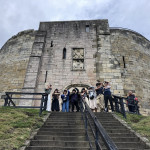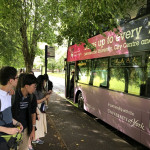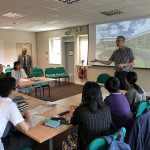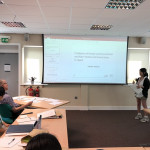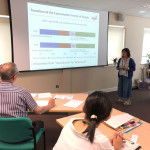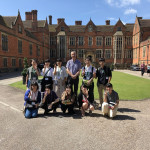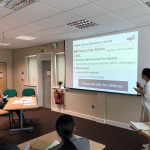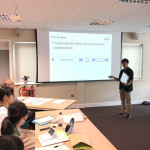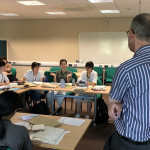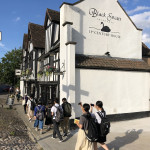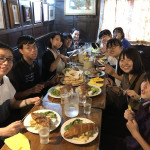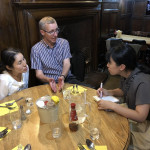イギリス研修3日目は、ヨークの名勝、クリフォードタワーの散歩から始まった。本日はこの研修の目的の一つであるヨーク大学での発表だ。朝食後、バスでヨーク大学まで向かった。教育学部Ian Davies教授にお世話になり、学内の講義室で本日のプログラムを開始した。まず、アイスブレークとして名前連結と誕生日連結ゲームをした。続いて他己紹介を行った。次に、Davies教授からヨーク大学の紹介が行われた。そしていよいよ生徒の発表である。最初は一年生の創造基礎の取り組みの報告「Local Citizenship Program done by Hyogo SHS」を発表した。続いて、グローバルリサーチについて、「Study in the second grade」として研究動機、目的、研究方法と現在までの研究について発表した。タイトルは以下の通りである。
“Educating Younger Generations About Cognitive Dementia Through Stick Soccer”
“4 Problems of Verbal Communication and Non-Verbal Communication”
“Incorporate active experiences into classes”
“What Do Foreign Tourists Want in Kobe”
大学内学食にて昼食をとり、Davies教授によるキャンパスツアーを行った。続いて講義室において、グローバルリサーチ同様、創造応用の取り組みについて、「Study in the second grade」として発表した。タイトルは以下の通りである。
“Considering Brexit From the View of Media Literacy”
“Why Can’t Trade Unions Adequately Promote Workplace Improvement”
“What industries should Japan develop”
“The Educational Effects of School Club Activities”
“Make Anime Bounding Shopping Easy With New Retail”
そして、Davies教授からイングランドの「多文化共生」と「シティズンシップ教育」について講義とワークショップがあった。最後に「What sort of place is the UK? How can we educate young people so they understand the UK and have the skills to participate in society?」という問いをDavies教授からいただき、生徒は明日のポスター発表に向けて準備した。ヨーク大学のプログラム後、バスで移動し、夕食をパブ「Black Swan」でとった。ここでも生徒は研究についてDavies教授に積極的に質問したり交流を深めた。食後、宿舎へ徒歩で移動し、3日目の活動を終えた。
〈生徒感想〉
Prof. Davies said that the following four points are important in the announcement. 1 Simple slide 2 Clear voice 3 Eye contact 4 unbiased data collection. I asked about Physical Social Health Education, which studies moral education and is similar to moral education in Japan. The most surprising part of the question is the task of teaching PSHE classes. As they do the class at home room time, there is no specialist teacher or they can change to other time. My image of English education was very advanced. So I was surprised that there are the same issues as Japanese education. Also, we gave Prof. Davies a lecture on “Citizenship Education”, a specialty of the teacher. One of the most important things in citizenship education was the ability to learn critically. For example, whether volunteering is not the only purpose. I think this is very important not only for citizenship education but also for all education.
Mr. Davies listened to our presentation and gave us a lot of helpful advice. He said that critical thinking was important. I thought that we need to take things from various viewpoints. When we see things from a fixed point of view, our horizon narrow and we can only think in a biased way. I will use this experience and advice to further develop my future research.

